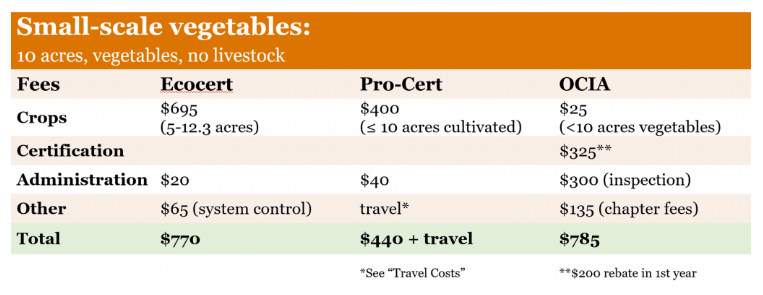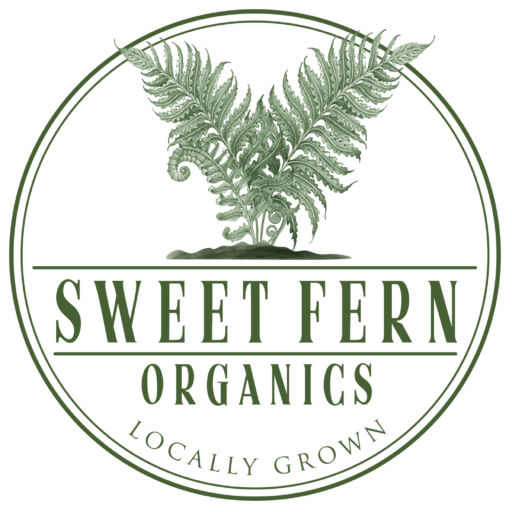Alright! So, you have made the big decision to get your market garden organically certified, or at least you are thinking about it and are curious about how to go start this task.
I’ll let you in on a little secret, we are pretty curious about certifying our market garden organic as well.
I have to admit, it’s kind of a daunting task, or at least it feels that way, especially when I am unsure of the process.
My goal in this article is to help make the organic certification process a little less daunting by outlining the steps you (and I) need to take to get our market garden certified organic in Ontario.
Let’s get to it!
What Does Certified Organic Mean?
Organic certification assures customers that the organic food they purchase is grown and processed in accordance with specific organic standards.
A certification body assesses the farm or processing facility to ensure that it is adhering to these standards.
In order to become certified, a farmer must not use any prohibited materials for 3 years prior to certification.
The farmer pays a fee for an inspector to review the history and setup of their operation, and to conduct an inspection of their facility.
If the farm is found to be in compliance with the standards, a certificate will be issued.
Annual updates and inspections are required to maintain a certified organic status.

The Organic Certification Process
Outlined below are the steps you need to take to get certified organic in Ontario.
1.Read About The Canadian Organic Standards
The first step in your journey to becoming certified organic should be to familiarize yourself with the Canadian Organic Standards.
These are the General Principles and Management Standards and the accompanying Permitted Substances List.
Reviewing these two documents, which by the way, you better get a big pot of coffee for because there is a lot of information to wade through, will help you determine if you are already complying with the Canadian Organic Standards or if you even want to.
Remember, if you are not currently compliant or are just starting out, you will need to follow the practices outlined in the guides for three years before you can become officially certified organic.
2. Develop A Production Plan
After you have studied the Canadian Organic Standards and decided to go ahead and get your market garden certified organic, it’s time to develop a production plan.
A production plan includes:
- Description of record keeping processes
- Input documentation
- Seed sources
- A 5-year field history
- Harvest records
- Sales invoices
- Bills of lading
- Lot numbers
- Records of transportation
You will need a completed production plan when applying to a certification body (more about that below).
As well, a production plan is a great way to get organized and clear on how your business will operate under organic certification.
3. Choose A Certification Body
There are a few third-party certification bodies you can choose from to register your market garden with when you wish to become certified organic.
Third-party certification bodies make sure organic producers follow the standards.
They are regulated by the Canadian Food Inspection Agency (CFIA) which maintains a list of approved organizations in Canada.
There are currently 7 certifying bodies in Ontario, but not all inspect producers, so it’s important to choose the right one for your market garden.
Cost of Certification
Here’s the truth, organic certification costs money.
For smaller farms, certification costs can add up, especially if you have a wide range of products such as field crops, livestock, maple syrup, or honey. Each product requires certification which means additional fees.
To top it off, farmers must re-certify each year.
Each certifying body has a different fee structure and offers different services, so it’s super important to do your research and choose the best one for your particular situation.
To get an idea of cost, in 2017, small producers (10 acres or less) certified for less than $1,000. For farms under 10 acres, more than half paid less than $600.
Certification Body Options
For very small operations whose owners don’t plan to sell their products outside Ontario, Pro-Cert’s “local organic” designation may be a viable option.
The base fee for Pro-Cert is $300.
Pro-Cert is not a federally recognized program. Producers do not get an organic certificate and cannot use the Canadian Organic logo, but it does prepare farmers for a smooth transition to full certification once they grow beyond 10 acres or wish to sell inter-provincially.
Eco-cert offers a flat rate of $525 certification options for farms that are under 5 acres.
Unlike Pro-Cert’s Local Organic designation, Eco-cert is compliant with national standards so you can use the Canadian Organic logo on your products.
Here is a table of estimated prices for three certification bodies in Ontario.

*This table represents estimated prices and may not include all costs. Does not include HST.
Travel Costs for Certification Bodies
Most certifying bodies work the cost of inspectors travels into their administration fees.
However, Pro-cert does not. They ask the farm being certified to share the cost of travel with other farms being inspected on that trip.
This means that the cost of certification through Pro-cert can vary widely, depending on farm location.
Just another aspect to consider when choosing a certification body.
Questions To Ask Your Certifier
Choosing a certifying body is no easy or simple task. You will want to have a good relationship with your certifier because they will be making annual trips out to your market farm to evaluate your processes.
Canadian Organic Growers has compiled a useful list of questions to ask your certifier to help ensure you have picked the right certification body for your farm.
As well, these questions can help determine if you can establish a good professional relationship with your certifier.
4. Undergo Initial and Certification Process
Once you have chosen your certification body and submitted your production plan to them, they will assign an inspector to come to your farm to evaluate (assuming all your paperwork was filed correctly with the right information).
Once an inspector has completed their report, it is reviewed by the certification body’s head office.
You may have to take some additional steps as a result of the initial inspection and review in order to become fully compliant with the standards.
5. Organic Certification Granted!
Once you have complied with any additional steps you may have needed to take, the Certification Body will issue your farm an official organic certificate!
Hooray! All your hard work has paid off and you can now officially label your products organic!
Summary
The certified organic process is by no means an easy one, as you can tell by the steps outlined in this article.
It takes quite some time to get certified, so the earlier you make up your mind to pursue it, the better.
Financial considerations are also a major part of the certification process.
I have listed some resources below that hold most of the information in this article, as well as some other useful links so be sure to thoroughly check them out.
If we choose to tackle organic certification of any kind, you can bet we will be documenting the process share our experience with you.
If you have any questions about getting certified organic on your market farm, please let me know in the comments below and I will do my best to help out.
Also, if you have been through the organic certification process and can offer some advice, please leave your comments down below.
Stay Local,
Kathy & Jon
your friendly neighbourhood growers
Resources
The Organic Council of Ontario
Ontario Ministry of Agriculture, Food, and Rural Affairs (OMAFRA)


0 Comments